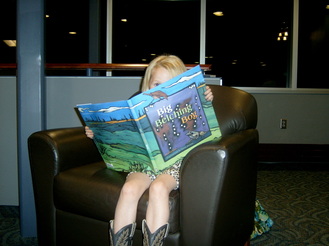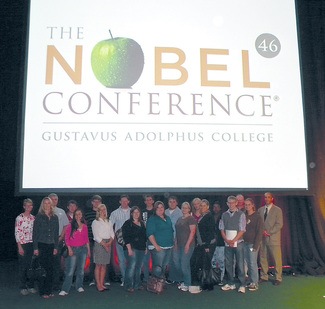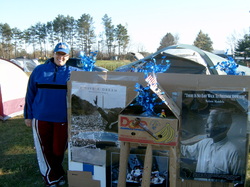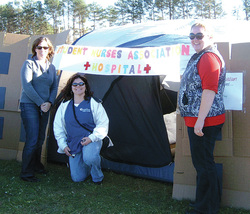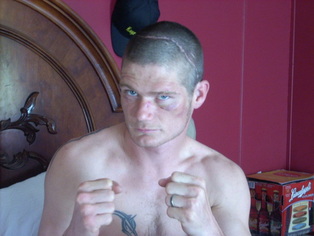'The Big Belching Bog'
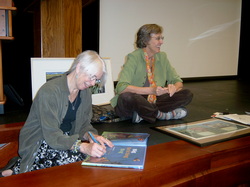
by Kathy Yaeger
staff writer
Anoka-Ramsey Community—College (ARCC) hosted its 23rd annual writer’s event Oct. 7, 2010. Phyllis Root, author and Betsy Bowen, illustrator, spoke about their collaboration on their first published work together "Big Belching Bog."
Big Bog State Recreation Area located in Wakish served as an inspiration to the author. Root, a Minnesotan since 1975, spoke of how she fell in love the first time she walked through the park in back in 2006. Inspiration took hold and Root began drafting the book as she discovered the wonder of the bog.
Root has been writing for children since 1979 and has recently started writing non-fiction. With over 45 published works. Root stated, "I view all projects as a learning experience and practice for the next idea."
Root was also excited to work with the illustrator Bowen. She said, "One of the best things that came out of the book was working with Betsy. I’ve been a fan of her illustrations since ‘Antler, Bear Canoe,’ one of Betsy’s best known works."
Native Minnesotan, Bowen, perfected her wood cutting and painting techniques to make the bog come to life. From the renovated church that serves as her studio in Grand Marais she let the words of Root’s book fill her imagination of the bog. Bowen said, "My most vivid childhood memory is a box of crayons, and drawing pictures for family and friends."
Adults and children alike attended the event to hear stories of the bog and how the book emerged start to finish. The kids sat wide-eyed while Root read her story, and seeing the bog through Bowen’s eyes. Meanwhile the grown-ups gained knowledge of the creative process of writing a children’s book.
Bill Breen, ARCC English professor, who co-organized the event said, "We’ve featured poets, novelists, essay writers but this is the first time I can remember that we’ve brought children’s literature artists. I think it’s informative to hear how they work together, and come up with a finished product." Bonnie Boese, ARCC librarian, co-organized the event with Breen.
Information about the bog, Phyllis Root, and Betsy Bowen can be found at their respective websites. www.dnr.state.mn.us, //woodcut.com: and www.childrensliteraturenetwork.org.
staff writer
Anoka-Ramsey Community—College (ARCC) hosted its 23rd annual writer’s event Oct. 7, 2010. Phyllis Root, author and Betsy Bowen, illustrator, spoke about their collaboration on their first published work together "Big Belching Bog."
Big Bog State Recreation Area located in Wakish served as an inspiration to the author. Root, a Minnesotan since 1975, spoke of how she fell in love the first time she walked through the park in back in 2006. Inspiration took hold and Root began drafting the book as she discovered the wonder of the bog.
Root has been writing for children since 1979 and has recently started writing non-fiction. With over 45 published works. Root stated, "I view all projects as a learning experience and practice for the next idea."
Root was also excited to work with the illustrator Bowen. She said, "One of the best things that came out of the book was working with Betsy. I’ve been a fan of her illustrations since ‘Antler, Bear Canoe,’ one of Betsy’s best known works."
Native Minnesotan, Bowen, perfected her wood cutting and painting techniques to make the bog come to life. From the renovated church that serves as her studio in Grand Marais she let the words of Root’s book fill her imagination of the bog. Bowen said, "My most vivid childhood memory is a box of crayons, and drawing pictures for family and friends."
Adults and children alike attended the event to hear stories of the bog and how the book emerged start to finish. The kids sat wide-eyed while Root read her story, and seeing the bog through Bowen’s eyes. Meanwhile the grown-ups gained knowledge of the creative process of writing a children’s book.
Bill Breen, ARCC English professor, who co-organized the event said, "We’ve featured poets, novelists, essay writers but this is the first time I can remember that we’ve brought children’s literature artists. I think it’s informative to hear how they work together, and come up with a finished product." Bonnie Boese, ARCC librarian, co-organized the event with Breen.
Information about the bog, Phyllis Root, and Betsy Bowen can be found at their respective websites. www.dnr.state.mn.us, //woodcut.com: and www.childrensliteraturenetwork.org.
Coping with grief

by Kathy Yaeger
staff writer
Understanding grief was the topic for the second annual mental wellness event on Oct. 12. Anoka-Ramsey Community—College (ARCC) welcomed Tom Ellis, M.A., L.M.F.T., executive director of the Center for Grief, Loss and Transition in St. Paul.
Ellis spoke of the foundation of grief and how it manifests on a cycle or "loop," and how to get through those difficult times. "Most people are familiar with the stages of grief; denial, anger, bargaining, depression and acceptance. What most people don’t understand is more often than not these stages may loop and not end with acceptance," stated Ellis.
Isabelle Schmidt, ARCC counselor stated, "It’s important to provide this information to the student body and community, after seeing the results of the Boynton Health Center Survey. We discovered that 19% of students experienced the death of someone close. And even more were diagnosed with depression (29%), anxiety (20%), and these same people were having difficulty managing their stress (26%)."
Schmidt organized the mental wellness event with Cindi Gilbert, who works with ARCC’s student activities department.
"Everyone experiences loss from time to time and it can be difficult to know how to help someone who is going through a tragedy. Knowing your role, staying within your comfort zone and having resource knowledge are useful tools when trying to help," Ellis stated.
A number of organizations were in attendance to answer questions and provide information on resources available including:
• Changing Gaits, Inc., equine-assisted therapy services ([email protected])
• Veterans Center (www.vetcenter.va.gov)
• The Refuge (www.therefugenetwork.org)
• Isanti County victims services (www.co.isanti.mn.us/depart.htm)
• Center for Grief, loss and transition (www.griefloss.org)
• Mental Health Association of Minnesota (www.mentalhealthmn.org)
• Volunteers of America mental health clinics (www.voamn.org)
• Allina behavioral health services (cambridgemedicalcenter.com)
Ellis stated, "Mental health is as important as physical health and grieving is a normal part of life, but it can be detrimental to you if it overtakes everything else." Ellis added, "Grief should never be avoided because it is a healthy response to loss. Instead it should be respected, and those who are grieving should have support to help them through the process."
Coping with loss? Contact someone who can help. For more information stop by ARCC’s counseling service offices (located by the information desk in the front lobby).
staff writer
Understanding grief was the topic for the second annual mental wellness event on Oct. 12. Anoka-Ramsey Community—College (ARCC) welcomed Tom Ellis, M.A., L.M.F.T., executive director of the Center for Grief, Loss and Transition in St. Paul.
Ellis spoke of the foundation of grief and how it manifests on a cycle or "loop," and how to get through those difficult times. "Most people are familiar with the stages of grief; denial, anger, bargaining, depression and acceptance. What most people don’t understand is more often than not these stages may loop and not end with acceptance," stated Ellis.
Isabelle Schmidt, ARCC counselor stated, "It’s important to provide this information to the student body and community, after seeing the results of the Boynton Health Center Survey. We discovered that 19% of students experienced the death of someone close. And even more were diagnosed with depression (29%), anxiety (20%), and these same people were having difficulty managing their stress (26%)."
Schmidt organized the mental wellness event with Cindi Gilbert, who works with ARCC’s student activities department.
"Everyone experiences loss from time to time and it can be difficult to know how to help someone who is going through a tragedy. Knowing your role, staying within your comfort zone and having resource knowledge are useful tools when trying to help," Ellis stated.
A number of organizations were in attendance to answer questions and provide information on resources available including:
• Changing Gaits, Inc., equine-assisted therapy services ([email protected])
• Veterans Center (www.vetcenter.va.gov)
• The Refuge (www.therefugenetwork.org)
• Isanti County victims services (www.co.isanti.mn.us/depart.htm)
• Center for Grief, loss and transition (www.griefloss.org)
• Mental Health Association of Minnesota (www.mentalhealthmn.org)
• Volunteers of America mental health clinics (www.voamn.org)
• Allina behavioral health services (cambridgemedicalcenter.com)
Ellis stated, "Mental health is as important as physical health and grieving is a normal part of life, but it can be detrimental to you if it overtakes everything else." Ellis added, "Grief should never be avoided because it is a healthy response to loss. Instead it should be respected, and those who are grieving should have support to help them through the process."
Coping with loss? Contact someone who can help. For more information stop by ARCC’s counseling service offices (located by the information desk in the front lobby).
He’s an overcomer
by Kirsten Ellison
Journalism student
"I think the most interesting thing about me is what I have overcome in life," said Michael Relitz, a student from Anoka-Ramsey Community College (ARCC).
After getting involved in alcohol and drugs, Relitz went into rehab and has been sober for over two years and is currently maintaining a 3.9 grade point average in college. Relitz said, "I have learned a lot from my past mistakes and it has made me a better person."
At the age of 24, Relitz met his wife Catherine and married her six months later. Shortly after they met, his wife joined the Army and they then spent their first four and a half months where she was stationed, in Campbell, Ken. His wife was deployed twice during that time and during her second deployment, lasting 15 months, he moved back to Minnesota and then enrolled at ARCC.
When asked whom his heroes are Relitz responded, "My number one hero is my wife. She is a strong woman who served proudly in the United States Army and became a Sergeant." Relitz enjoys spending time with his wife. Their hobbies include camping in the summer, fishing and watching T.V. He also enjoys playing poker and golfing.
At one point in his life, Relitz didn’t have any goals, but now he has big dreams and is determined to achieve them. "My biggest dream in life is to start a family with my wife, get a good job and raise my kids to be the best that they can be," he said. He also aspires to someday create a television series. "I have a lot of great ideas that I can hopefully someday bring to life, and bring people out there in T.V. land some enjoyment," Relitz stated.
Journalism student
"I think the most interesting thing about me is what I have overcome in life," said Michael Relitz, a student from Anoka-Ramsey Community College (ARCC).
After getting involved in alcohol and drugs, Relitz went into rehab and has been sober for over two years and is currently maintaining a 3.9 grade point average in college. Relitz said, "I have learned a lot from my past mistakes and it has made me a better person."
At the age of 24, Relitz met his wife Catherine and married her six months later. Shortly after they met, his wife joined the Army and they then spent their first four and a half months where she was stationed, in Campbell, Ken. His wife was deployed twice during that time and during her second deployment, lasting 15 months, he moved back to Minnesota and then enrolled at ARCC.
When asked whom his heroes are Relitz responded, "My number one hero is my wife. She is a strong woman who served proudly in the United States Army and became a Sergeant." Relitz enjoys spending time with his wife. Their hobbies include camping in the summer, fishing and watching T.V. He also enjoys playing poker and golfing.
At one point in his life, Relitz didn’t have any goals, but now he has big dreams and is determined to achieve them. "My biggest dream in life is to start a family with my wife, get a good job and raise my kids to be the best that they can be," he said. He also aspires to someday create a television series. "I have a lot of great ideas that I can hopefully someday bring to life, and bring people out there in T.V. land some enjoyment," Relitz stated.
Project: Informed created by ARCC PSEO student
by Joe Schmitz
Journalism student
In the age of technology and many opinions, Josh Gloe, a high school student, has the perfect answer.
Gloe created Project:Informed in late December 2009. It is a discussion forum in which members can chat, talk about or debate any topic they please. The goal of the site is to get people involved in current issues and for the members to freely discuss their side of the argument. The forum includes discussions on anything ranging from video games to religion.
"I hope to turn the board into a thriving community to debate and share thoughts," says the 17-year-old Gloe. "We have members as young as 13 and as old as 50, so certainly everyone is welcome."
he forum has a section for general thoughts, as well as an opinion section. The opinion section is moderated by Gloe, so that the debates don’t become offensive or derogatory, making the site safe for young members.
Armed with a new site and goals to attend a four-year university to double-major in mass communications and marketing, Gloe claims he is just scratching the surface of his potential. He encourages people to check out the site.
He said, "It has a laid-back and welcoming feeling with plenty of areas for fun, but also a professional and controlled area for members to debate and discuss more serious issues."
Gloe grew up in St. Francis, Minn. and currently attends school at Anoka-Ramsey Community College. He also volunteers at the local church and at Feed My Starving Children.
Gloe hopes his site is the next big hit. It can be found at http://projectinformed.proboards.com/.
Journalism student
In the age of technology and many opinions, Josh Gloe, a high school student, has the perfect answer.
Gloe created Project:Informed in late December 2009. It is a discussion forum in which members can chat, talk about or debate any topic they please. The goal of the site is to get people involved in current issues and for the members to freely discuss their side of the argument. The forum includes discussions on anything ranging from video games to religion.
"I hope to turn the board into a thriving community to debate and share thoughts," says the 17-year-old Gloe. "We have members as young as 13 and as old as 50, so certainly everyone is welcome."
he forum has a section for general thoughts, as well as an opinion section. The opinion section is moderated by Gloe, so that the debates don’t become offensive or derogatory, making the site safe for young members.
Armed with a new site and goals to attend a four-year university to double-major in mass communications and marketing, Gloe claims he is just scratching the surface of his potential. He encourages people to check out the site.
He said, "It has a laid-back and welcoming feeling with plenty of areas for fun, but also a professional and controlled area for members to debate and discuss more serious issues."
Gloe grew up in St. Francis, Minn. and currently attends school at Anoka-Ramsey Community College. He also volunteers at the local church and at Feed My Starving Children.
Gloe hopes his site is the next big hit. It can be found at http://projectinformed.proboards.com/.
Making food good: What makes food good becomes a complicated interdisciplinary quest
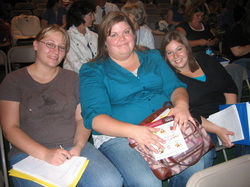
by K.H. Kennedy
contributing writer
The topic of food permeates the lives of all human beings on planet earth. Answering the question, "what makes food good?" becomes a complicated interdisciplinary quest in which some of the greatest minds of our time gathered for the 46 Nobel Conference at Gustavus Adolphus College on Oct. 5 and 6, 2010.
Anoka-Ramsey Community Colege professors Mary Januschka, Brad Wold and Brian Mansell accompanied students from the Seminar in Biology class to intentionally think about the ways in which various meanings of the word "good" intertwine with each other, sometimes supporting, sometimes challenging each other.
Speaker Marion Nestle, Ph.D., believes that science, economics and politics must effectively work together to affect the food choices of individuals, countries and the world. Nestle wonders how agriculture became a Wall Street entity forced to show profits every 90 days. Currently the U.S. produces 3,900 calories per day for each citizen, wasting a large amount of calories that could be utilized by starving nations.
Crop diversity conservator Cary Fowler, Ph.D, combines his expertise in genetics and food cultivation with his passion for social justice in a quest to save, collect and manage the genetic diversity of our food crops. Cary, working with the Norwegian government helped create and underground, climate controlled environment where countries can deposit their seeds in the secure Global Diversity Trust, for future generations.
Bina Agarwal, Ph.D., years researching economics led her to conclude that technological change in agriculture, including mechanization, had increased, not decreased the demand for female labor in India. Working within a political framework, she challenges traditional approaches to food security, by arguing for more collective small farm enterprises. Once again, she emphasized the need for greater cooperation between countries for creating a world free of hunger.
Paul Thompson, Ph.D. spoke of agricultural ethics. He found strong relationships among cultural norms, moral identity, and food production. He believes that agrarianism has some lessons for modern sustainability of the future.
Linda Bartoshuk, Ph.D., described the complex relationships between tasting pleasure and health. Her groundbreaking research on taste buds led to the discovery of "supertasters". Further research suggests the significance of this heightened capacity. Taste has been linked to behaviors like dietary choices, smoking and drinking. Audience members took part in an experiment to test which category of taster they matched.
Jeffrey Friedman, M.D., Ph.D, researches the relationship between food intake and body weight. He discovered the hormone leptin and its receptors, which signal the brain of fullness and balance caloric expenditures. Friedman believes that obesity is a complicated mix of biological, cultural and behavioral influences. Hundreds of millions of dollars are spent every year in the U.S. for weight loss cures. However, Jeffrey stated that a comprehensive plan including biology, lifestyle and understanding has no "magic bullet", but needs to be understood and implemented on a global level.
contributing writer
The topic of food permeates the lives of all human beings on planet earth. Answering the question, "what makes food good?" becomes a complicated interdisciplinary quest in which some of the greatest minds of our time gathered for the 46 Nobel Conference at Gustavus Adolphus College on Oct. 5 and 6, 2010.
Anoka-Ramsey Community Colege professors Mary Januschka, Brad Wold and Brian Mansell accompanied students from the Seminar in Biology class to intentionally think about the ways in which various meanings of the word "good" intertwine with each other, sometimes supporting, sometimes challenging each other.
Speaker Marion Nestle, Ph.D., believes that science, economics and politics must effectively work together to affect the food choices of individuals, countries and the world. Nestle wonders how agriculture became a Wall Street entity forced to show profits every 90 days. Currently the U.S. produces 3,900 calories per day for each citizen, wasting a large amount of calories that could be utilized by starving nations.
Crop diversity conservator Cary Fowler, Ph.D, combines his expertise in genetics and food cultivation with his passion for social justice in a quest to save, collect and manage the genetic diversity of our food crops. Cary, working with the Norwegian government helped create and underground, climate controlled environment where countries can deposit their seeds in the secure Global Diversity Trust, for future generations.
Bina Agarwal, Ph.D., years researching economics led her to conclude that technological change in agriculture, including mechanization, had increased, not decreased the demand for female labor in India. Working within a political framework, she challenges traditional approaches to food security, by arguing for more collective small farm enterprises. Once again, she emphasized the need for greater cooperation between countries for creating a world free of hunger.
Paul Thompson, Ph.D. spoke of agricultural ethics. He found strong relationships among cultural norms, moral identity, and food production. He believes that agrarianism has some lessons for modern sustainability of the future.
Linda Bartoshuk, Ph.D., described the complex relationships between tasting pleasure and health. Her groundbreaking research on taste buds led to the discovery of "supertasters". Further research suggests the significance of this heightened capacity. Taste has been linked to behaviors like dietary choices, smoking and drinking. Audience members took part in an experiment to test which category of taster they matched.
Jeffrey Friedman, M.D., Ph.D, researches the relationship between food intake and body weight. He discovered the hormone leptin and its receptors, which signal the brain of fullness and balance caloric expenditures. Friedman believes that obesity is a complicated mix of biological, cultural and behavioral influences. Hundreds of millions of dollars are spent every year in the U.S. for weight loss cures. However, Jeffrey stated that a comprehensive plan including biology, lifestyle and understanding has no "magic bullet", but needs to be understood and implemented on a global level.
Do students care about politics?
by Josh Gloe
Journalism student
"Political involvement is a necessity," according to Anoka-Ramsey Community College (ARCC) student John Loomis. He added, "If a person, especially youth, are not active in politics, where will we be in 10 years? In a pickle, that’s where."
"I rank political involvement and awareness at the top of my list," Loomis continued. "The nation will not thrive correctly if we the people do not wake up and become involved. There is most definitely a lack of political awareness. A lot of people just don’t really care..." Other students and faculty affirmed the thought that the next generation probably isn’t as politically aware and involved as they should be. ARCC student Collin Plante reflected the thoughts of Loomis, saying that he does not believe there is enough political awareness within young people today, particularly fellow college students.
However, Plante did add that he believes that, "Most of the political issues are mostly hype."
To get additional information on ARCC students’ attitudes towards political awareness and involvement, a poll of 27 of the college’s students was conducted.
The students were all asked, "How much would you say you really care about political issues in general?"
The majority, 44% of the students, said that they "kind of care" about political issues. 26% said they "definitely care", 11% "care", another 11% are "mostly indifferent", and the final 7% of the students simply "don’t care" about political issues.
Among the respondents who "don’t care" about politics is student Rachel Guck. "It bores me," she said. "Plus it’s a waste of time. Not many people actually truly care for our country. I guess the army men and women do, but not many politicians. They made it a career. It shouldn’t be a career, it should be a public service. They should want to do it for their country, and the people."
In the political involvement part of the survey mentioned above, 14% of respondents are not planning on voting or being politically active at all within the next five years. Of these respondents, 57% said that they are planning on voting within the next five years. The remaining 29% plan to vote within the next five years, as well as being politically involved in some other way, such as attending a caucus or contacting a representative.
This can be compared to data from the national poll out of Tufts University, "National Survey of Civic and Political Engagement of Young People". 500 college students were interviewed. 79.1% had voted in the previous election (which was the November elections of 2006 at the time of the survey).
Cahli Heath is a student who doesn’t care about politics, yet still plans on being politically involved, at least as far as voting goes. "I’ll vote," she said, but also added,"I don’t really give a shit about paying attention to politics. I think they fight too much and use stupid tactics to make them look better than the other party."
The Tufts survey mentioned above also showed that there may be a difference between the political involvement of college students compared to non-college students of the same age group (18-24 years old). The summary in the results of the survey says, "The Tisch Survey has provided data to demonstrate that, among young people aged 18 to 24, there are many differences between those who are full-time college students and those who are not. The overall pattern is unmistakable. Full-time college students are much more civically and politically engaged than their non-college counterparts."
Similarly, ARCC faculty member John Mago capped Loomis’ thesis that was cited at the beginning of this article. "If society in general became educated," Mago said, "those in government positions cannot oppress the public anymore."
John Herbert is an ARCC professor. He teaches Political Science classes at the Coon Rapids campus of the college. This means he deals every day with students who are the next generation and are the future job creators and politicians of America.
Herbert does believe that there is a lack of political awareness and involvement in current college students. He also made the point that, in his opinion, simply voting is not enough to be a true active citizen, "especially with our two party system where nothing seems to ever get done legislatively," he said. "Look at the results of [the recent] election in England for example."
As a college professor, he expressed his thoughts on whether or not attending college increases a student’s political awareness. "It can," he said, "but not much unless the student actively tries to learn and then put that knowledge to work. I fear that many students just go through the motions."
He added that, "By the time one hits college it is probably too late to stimulate involvement. That comes from the dinner table and then discussion with peers.
Journalism student
"Political involvement is a necessity," according to Anoka-Ramsey Community College (ARCC) student John Loomis. He added, "If a person, especially youth, are not active in politics, where will we be in 10 years? In a pickle, that’s where."
"I rank political involvement and awareness at the top of my list," Loomis continued. "The nation will not thrive correctly if we the people do not wake up and become involved. There is most definitely a lack of political awareness. A lot of people just don’t really care..." Other students and faculty affirmed the thought that the next generation probably isn’t as politically aware and involved as they should be. ARCC student Collin Plante reflected the thoughts of Loomis, saying that he does not believe there is enough political awareness within young people today, particularly fellow college students.
However, Plante did add that he believes that, "Most of the political issues are mostly hype."
To get additional information on ARCC students’ attitudes towards political awareness and involvement, a poll of 27 of the college’s students was conducted.
The students were all asked, "How much would you say you really care about political issues in general?"
The majority, 44% of the students, said that they "kind of care" about political issues. 26% said they "definitely care", 11% "care", another 11% are "mostly indifferent", and the final 7% of the students simply "don’t care" about political issues.
Among the respondents who "don’t care" about politics is student Rachel Guck. "It bores me," she said. "Plus it’s a waste of time. Not many people actually truly care for our country. I guess the army men and women do, but not many politicians. They made it a career. It shouldn’t be a career, it should be a public service. They should want to do it for their country, and the people."
In the political involvement part of the survey mentioned above, 14% of respondents are not planning on voting or being politically active at all within the next five years. Of these respondents, 57% said that they are planning on voting within the next five years. The remaining 29% plan to vote within the next five years, as well as being politically involved in some other way, such as attending a caucus or contacting a representative.
This can be compared to data from the national poll out of Tufts University, "National Survey of Civic and Political Engagement of Young People". 500 college students were interviewed. 79.1% had voted in the previous election (which was the November elections of 2006 at the time of the survey).
Cahli Heath is a student who doesn’t care about politics, yet still plans on being politically involved, at least as far as voting goes. "I’ll vote," she said, but also added,"I don’t really give a shit about paying attention to politics. I think they fight too much and use stupid tactics to make them look better than the other party."
The Tufts survey mentioned above also showed that there may be a difference between the political involvement of college students compared to non-college students of the same age group (18-24 years old). The summary in the results of the survey says, "The Tisch Survey has provided data to demonstrate that, among young people aged 18 to 24, there are many differences between those who are full-time college students and those who are not. The overall pattern is unmistakable. Full-time college students are much more civically and politically engaged than their non-college counterparts."
Similarly, ARCC faculty member John Mago capped Loomis’ thesis that was cited at the beginning of this article. "If society in general became educated," Mago said, "those in government positions cannot oppress the public anymore."
John Herbert is an ARCC professor. He teaches Political Science classes at the Coon Rapids campus of the college. This means he deals every day with students who are the next generation and are the future job creators and politicians of America.
Herbert does believe that there is a lack of political awareness and involvement in current college students. He also made the point that, in his opinion, simply voting is not enough to be a true active citizen, "especially with our two party system where nothing seems to ever get done legislatively," he said. "Look at the results of [the recent] election in England for example."
As a college professor, he expressed his thoughts on whether or not attending college increases a student’s political awareness. "It can," he said, "but not much unless the student actively tries to learn and then put that knowledge to work. I fear that many students just go through the motions."
He added that, "By the time one hits college it is probably too late to stimulate involvement. That comes from the dinner table and then discussion with peers.
New seeds planted
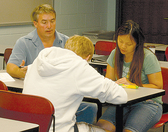
by Holly Buboltz
staff writer
On Oct. 19, 2010, innovations and new ideas were put into action.
On a 10-acre plot at the Cambridge Campus of Anoka-Ramsey Community College (ARCC) the first seeds have been planted that will potentially create new jobs in the community and create new departments and experiences for the students at ARCC.
The seeds planted are called Honeycress, which is a type of weed. This is the first of two new biofuel crops, the second being Camelina. These crops work together and yield as much as 100 gallons of biodiesel per acre of land in a year.
Appealing to chemistry, agriculture, biology, business, and economics majors are these new seeds and the biodiesel process. In the future students interested will receive training and participate in research development. "We are excited to have Ever Cat Fuels from Isanti as our business partner in this training program. Our ultimate goals are to help prepare people for green jobs and to help create a clean and renewable energy source," said Jones.
The McGyan process is used to turn these crops into the useful biodiesel fuels. This process is put into use at the Ever Cat Fuels location in Isanti. McGyan is a combination of the three names innovators of this process; McNeff, Gyberg, and Yan.
At this seeding event was Clayton McNeff, whose father was one of the pioneers of the McGyan process. His family has personally invested $7 million into this process.
Biodiesel technologies and the McGyan process contribute to a greener campus, energy efficiency, and new jobs, says McNeff. Stephen Jones, ARCC Coon Rapids Campus, said, "We (at the Professional Training Center) have been developing curriculum and training programs for the past two years to prepare people for the new green jobs that will result from the state's initiatives in energy efficiency and renewable energy industries. We are excited to be awarded a $100,000 grant from the Governor's Workforce Development Council to develop and deliver training for people interested in working in the bio-fuels industry." Clayton McNeff added, "Thousands of jobs are potentially available [through this process]".
Putting this unused 10 acres just across from the community center on the Cambridge Campus at ARCC to use is among the many benefits that will be reaped from this crop.
staff writer
On Oct. 19, 2010, innovations and new ideas were put into action.
On a 10-acre plot at the Cambridge Campus of Anoka-Ramsey Community College (ARCC) the first seeds have been planted that will potentially create new jobs in the community and create new departments and experiences for the students at ARCC.
The seeds planted are called Honeycress, which is a type of weed. This is the first of two new biofuel crops, the second being Camelina. These crops work together and yield as much as 100 gallons of biodiesel per acre of land in a year.
Appealing to chemistry, agriculture, biology, business, and economics majors are these new seeds and the biodiesel process. In the future students interested will receive training and participate in research development. "We are excited to have Ever Cat Fuels from Isanti as our business partner in this training program. Our ultimate goals are to help prepare people for green jobs and to help create a clean and renewable energy source," said Jones.
The McGyan process is used to turn these crops into the useful biodiesel fuels. This process is put into use at the Ever Cat Fuels location in Isanti. McGyan is a combination of the three names innovators of this process; McNeff, Gyberg, and Yan.
At this seeding event was Clayton McNeff, whose father was one of the pioneers of the McGyan process. His family has personally invested $7 million into this process.
Biodiesel technologies and the McGyan process contribute to a greener campus, energy efficiency, and new jobs, says McNeff. Stephen Jones, ARCC Coon Rapids Campus, said, "We (at the Professional Training Center) have been developing curriculum and training programs for the past two years to prepare people for the new green jobs that will result from the state's initiatives in energy efficiency and renewable energy industries. We are excited to be awarded a $100,000 grant from the Governor's Workforce Development Council to develop and deliver training for people interested in working in the bio-fuels industry." Clayton McNeff added, "Thousands of jobs are potentially available [through this process]".
Putting this unused 10 acres just across from the community center on the Cambridge Campus at ARCC to use is among the many benefits that will be reaped from this crop.
TRY-OUT FOR SPRING
PLAY NOV. 17
There are four roles available in the production "Dinner With Friends" coming in February 2011. Auditions are Nov. 17. Contact director Lisa Weaver at [email protected] for more information.
See more by clicking here.
See more by clicking here.
Students raise awareness about homelessness at annual Box City
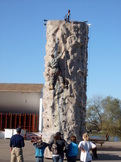
by Kathy Yaeger
staff writer
Anoka-Ramsey Community—College (ARCC) faculty and students joined the community at the third annual Box City fund raising event Oct. 16. People gathered at the Isanti County Fairgrounds to set up dwellings, raise money and participate in an evening of fun.
A number of community organizations were in attendance including ARCC’s own student nurse association, student senate, co-ed softball team and rendezvous coffee. While participating in the events they helped raise a total of $24,000.
ARCC’s student nurse association (SNA) set up a dwelling and offered free blood pressure checks. SNA member Shay Carchedi stated, "Any one of us could wind up in financial trouble during these tough economic times. It is important that we make sure help is available."
Carchedi added, "When you care for your community and get a sense of its needs, I feel it makes you a better health care provider for when you graduate and begin working."
SNA co-president Debbi Mansell said, "The SNA wants to be involved and make a presence in the community so people are aware of the program and it is open to all to join or attend meetings."
Marge Burns, New Pathways, Inc. co-founder and volunteer, stated, "New Pathways, Inc. has helped shelter homeless families with children from Chisago, Isanti, Kanabec, Mille Lacs, and Pine counties. Also New Pathways, Inc. is the only shelter within the five counties with comprehensive support. Since 2000 this organization has helped over 338 families, and 92% of those families successfully moved into permanent housing."
Burns added, "Box City is here mainly as a fund raiser during homeless awareness month. All activities are geared to bring awareness to the plight of the homeless. And everything that comes in goes directly to help families in need. Box City grows every year and last year we managed to raise $25,000 to help the homeless in the community."
Some of the activities available for Box City residents were, scavenger hunts, rock wall climbing, bingo, and karaoke, along with a soup kitchen to warm up and get a bite to eat. Sunday morning the event ended with breakfast, an interfaith service and cleanup.
For more information on New Pathways, Inc. check out their facebook page.
staff writer
Anoka-Ramsey Community—College (ARCC) faculty and students joined the community at the third annual Box City fund raising event Oct. 16. People gathered at the Isanti County Fairgrounds to set up dwellings, raise money and participate in an evening of fun.
A number of community organizations were in attendance including ARCC’s own student nurse association, student senate, co-ed softball team and rendezvous coffee. While participating in the events they helped raise a total of $24,000.
ARCC’s student nurse association (SNA) set up a dwelling and offered free blood pressure checks. SNA member Shay Carchedi stated, "Any one of us could wind up in financial trouble during these tough economic times. It is important that we make sure help is available."
Carchedi added, "When you care for your community and get a sense of its needs, I feel it makes you a better health care provider for when you graduate and begin working."
SNA co-president Debbi Mansell said, "The SNA wants to be involved and make a presence in the community so people are aware of the program and it is open to all to join or attend meetings."
Marge Burns, New Pathways, Inc. co-founder and volunteer, stated, "New Pathways, Inc. has helped shelter homeless families with children from Chisago, Isanti, Kanabec, Mille Lacs, and Pine counties. Also New Pathways, Inc. is the only shelter within the five counties with comprehensive support. Since 2000 this organization has helped over 338 families, and 92% of those families successfully moved into permanent housing."
Burns added, "Box City is here mainly as a fund raiser during homeless awareness month. All activities are geared to bring awareness to the plight of the homeless. And everything that comes in goes directly to help families in need. Box City grows every year and last year we managed to raise $25,000 to help the homeless in the community."
Some of the activities available for Box City residents were, scavenger hunts, rock wall climbing, bingo, and karaoke, along with a soup kitchen to warm up and get a bite to eat. Sunday morning the event ended with breakfast, an interfaith service and cleanup.
For more information on New Pathways, Inc. check out their facebook page.
Instructor wishes students wouldn’t be afraid to try new things in class
by Rachel Kempen
Journalism student
Who knew that Girl Scout leaders, and craft workshops could be the wake-up call to becoming an instructor? MaryAnn David, a business instructor at Cambridge’s Anoka-Ramsey Community College (ARCC) sure didn’t know. "I started teaching art workshops and trained adult Girl Scout leaders. Then it occurred to me that I wanted to be a teacher. I really enjoyed sharing my skills," said David.
David has since then spent over 30 years as a teacher, and another 15 years as a college instructor. Today one can find her teaching business classes at ARCC. However, she won’t be there for all that much longer. "Currently I’m at retirement age; I plan to continue at this college as an instructor for perhaps a few more years but after that it’s time to pack my bags," explained David.
Over the course of 45 years of teaching, David has learned a lot about herself she said. "I didn’t expect so much fun and enjoyment in doing what I now love to do! I didn’t ever think I could be teaching college level courses. It’s very exciting!" David stated.
"I have learned that the more I teach, the more I realize I don’t know. I learn so much from my students every day. It’s great to learn from them," said David. "I am still in awe of what I do!"
During her time as an ARCC instructor, David said she had one student teach her an important lesson. There is nothing like a good nap. "I taught a keyboarding class to a very elderly couple (husband & wife) who tried their very best to manage the keyboard. Once though the elderly man fell asleep at the computer, and just leaned on the keys resulting in numerous pages of the same letter of the alphabet going on and on. I just let him sleep, as did his wife," explained David.
However, David does the majority of the teaching in her classes. There she spends her time reaching out to students, and teaching them about computers and their software. But David said didn’t always teach about computers.
"I’ve always been a good typist and have had years of experience as a secretary. When everything changed to computers, I liked the idea of composing letters and messages via the keyboard and making corrections as you go. We used to use correction tape and white-out and before that, typing erasers and carbon paper. Can you even imagine?" stated David.
But that wasn’t the only thing that excited David she said. "I love the ability to think and speed-write as you go, and then make the corrections right in front of you before printing. Also, because I am not very good at math, I so enjoy Excel because it can do my math for me!" David explained.
Although David can agree that computers and technology often benefit people, there are some down sides she points out. "With today’s technology and the demand for accelerated, on-line classes, I feel the ‘personal touch’ has been lost. I believe personal communication is critical, and that seems to be gravitating more and more toward ‘texting’… Where is the interpersonal communication and reading of body language to interpret the message as intended?" commented David.
Also David mentioned that technology doesn’t come without its faults. "The college network has a way of ‘acting up’ and it gets frustrating when the computer saves a student’s files to a place where they then can’t find them again," explained David. "Sometimes though the students just need to pay a little bit more attention to where they save things,"
Although technology can be frustrating, it doesn’t have to be scary said David. "I wish for my students to not be afraid of the computers and to try new things out," she said. With her older generation students David understands that most are afraid and don’t like the change that technology brings. She can relate.
"At mid-life, I once went from a manual typewriter on the job to an electric, and that was miserable! Younger folks don’t seem to hesitate about jumping into new things and adapting; perhaps they don’t have the experience behind them to see what could go wrong," David stated.
However, she explains that one shouldn’t be held back by technology but embrace it. "I am at retirement age and going strong; my mother-in-law is 88 with a computer and plays games and surfs the Internet all the time," said David. "But, I understand that computers can intimidate both the old and young."
For the next couple years MaryAnn David says she will remain at the ARCC campus. During that time she says her positive and cheery personality will be there to continue to teach students to not be intimidated by computers. She boosts, "I’m quite animated and lively in the classroom."
Journalism student
Who knew that Girl Scout leaders, and craft workshops could be the wake-up call to becoming an instructor? MaryAnn David, a business instructor at Cambridge’s Anoka-Ramsey Community College (ARCC) sure didn’t know. "I started teaching art workshops and trained adult Girl Scout leaders. Then it occurred to me that I wanted to be a teacher. I really enjoyed sharing my skills," said David.
David has since then spent over 30 years as a teacher, and another 15 years as a college instructor. Today one can find her teaching business classes at ARCC. However, she won’t be there for all that much longer. "Currently I’m at retirement age; I plan to continue at this college as an instructor for perhaps a few more years but after that it’s time to pack my bags," explained David.
Over the course of 45 years of teaching, David has learned a lot about herself she said. "I didn’t expect so much fun and enjoyment in doing what I now love to do! I didn’t ever think I could be teaching college level courses. It’s very exciting!" David stated.
"I have learned that the more I teach, the more I realize I don’t know. I learn so much from my students every day. It’s great to learn from them," said David. "I am still in awe of what I do!"
During her time as an ARCC instructor, David said she had one student teach her an important lesson. There is nothing like a good nap. "I taught a keyboarding class to a very elderly couple (husband & wife) who tried their very best to manage the keyboard. Once though the elderly man fell asleep at the computer, and just leaned on the keys resulting in numerous pages of the same letter of the alphabet going on and on. I just let him sleep, as did his wife," explained David.
However, David does the majority of the teaching in her classes. There she spends her time reaching out to students, and teaching them about computers and their software. But David said didn’t always teach about computers.
"I’ve always been a good typist and have had years of experience as a secretary. When everything changed to computers, I liked the idea of composing letters and messages via the keyboard and making corrections as you go. We used to use correction tape and white-out and before that, typing erasers and carbon paper. Can you even imagine?" stated David.
But that wasn’t the only thing that excited David she said. "I love the ability to think and speed-write as you go, and then make the corrections right in front of you before printing. Also, because I am not very good at math, I so enjoy Excel because it can do my math for me!" David explained.
Although David can agree that computers and technology often benefit people, there are some down sides she points out. "With today’s technology and the demand for accelerated, on-line classes, I feel the ‘personal touch’ has been lost. I believe personal communication is critical, and that seems to be gravitating more and more toward ‘texting’… Where is the interpersonal communication and reading of body language to interpret the message as intended?" commented David.
Also David mentioned that technology doesn’t come without its faults. "The college network has a way of ‘acting up’ and it gets frustrating when the computer saves a student’s files to a place where they then can’t find them again," explained David. "Sometimes though the students just need to pay a little bit more attention to where they save things,"
Although technology can be frustrating, it doesn’t have to be scary said David. "I wish for my students to not be afraid of the computers and to try new things out," she said. With her older generation students David understands that most are afraid and don’t like the change that technology brings. She can relate.
"At mid-life, I once went from a manual typewriter on the job to an electric, and that was miserable! Younger folks don’t seem to hesitate about jumping into new things and adapting; perhaps they don’t have the experience behind them to see what could go wrong," David stated.
However, she explains that one shouldn’t be held back by technology but embrace it. "I am at retirement age and going strong; my mother-in-law is 88 with a computer and plays games and surfs the Internet all the time," said David. "But, I understand that computers can intimidate both the old and young."
For the next couple years MaryAnn David says she will remain at the ARCC campus. During that time she says her positive and cheery personality will be there to continue to teach students to not be intimidated by computers. She boosts, "I’m quite animated and lively in the classroom."
MMA STARS: The Blumer brothers are the guys that grew up next door
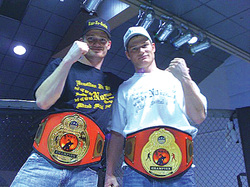
by Rosalie Young
Journalism student
Marvin and Melvin Blumer are the guys-next-door that grew up in a small Minnesota town. Maybe a little hellion thrown in, they found a trade that would support their families and still give them time to pursue their hobbies.
Marvin said, "I always thought I’d do concrete work until I could retire from the manual side of it and then run a company of my own."
With the lack of jobs and unemployment benefits winding down, the brothers have pursued another avenue of work. Being naturally athletic men and still wanting to work together, they have dedicated their time and energy into the world of Mixed Martial Arts (MMA). MMA is a full-contact, combat sport that allows a wide variety of fighting techniques and skills that can be used in competitions. The sport has become extremely popular, rivaling professional wrestling and boxing. It is also a good avenue for men to release pent up aggression; while they wait for the country to rebound from this recession and re-employ them.
Mixed martial arts competitions are alive and well in Savage, Minn. at a bar called Neisen’s Sports Bar. The brothers started entering amateur competitions in September of 2009 at this venue. By February of 2010 they won their first amateur title belts on the same evening. Marvin won the feather-weight belt; Melvin won the light-weight belt.
After watching their fights on a winter evening, Sean Blumer, their older brother said, "This was by far the most intense night of all. They each fought with text-book perfection. I’m so proud of them. Can’t wait to see what the future holds for these extremely talented athletes."
Since that evening the brothers have opened their own gym and created a business called: The Minnesota Militia of Mixed Martial Arts (MMA) and Fitness in Taylors Falls, Minn. Their website with information on the programs that they offer is located at http://www.mnmilitiammafitness.webs.com/ . "From the beginner to elite athlete, we make it our goal to provide members with the knowledge and skill necessary to meet their fitness goals; whether it be strength training, self-defense or competition level MMA." is part of their mission statement.
Right now their class schedule runs:
*Monday and Tuesday evenings (striking class)
*Wednesday evenings (grappling class)
*Thursday evenings (Brazilian Jujitsu wrestling)
*Friday evenings (MMA class).
Their motto is: To be the best, you have to out-work the rest.
Both men have wives who are attending college. Melvin’s wife, Echo, is a full-time student studying sports physical therapy. Marvin’s wife, Tasha, is a college student majoring in law-enforcement at Century College and she also steps in to teach the ladies who have become members of their gym. She specializes in self-defense.
Is this an easy way to make a living? "No," Marvin responds, "but I like to teach this form of martial arts. MMA competitions are new and growing with audiences all over the world. Getting in this business on the ground floor has the potential of making a lot of money and a reputation for our Minnesota gym."
On April 23, eight men from the Minnesota Militia of MMA and Fitness, competed in Chicago, Ill. at the North American Grappling Association (NAGA) event. Competitors hailed from all around this country. Minnesota was well represented with Marvin winning fifth and tenth place in two different divisions (gi and no-gi) in his weight class. NAGA is offering competition venues in Las Vegas, Dallas, Atlanta, Newark and even Paris, France for 2010.
Journalism student
Marvin and Melvin Blumer are the guys-next-door that grew up in a small Minnesota town. Maybe a little hellion thrown in, they found a trade that would support their families and still give them time to pursue their hobbies.
Marvin said, "I always thought I’d do concrete work until I could retire from the manual side of it and then run a company of my own."
With the lack of jobs and unemployment benefits winding down, the brothers have pursued another avenue of work. Being naturally athletic men and still wanting to work together, they have dedicated their time and energy into the world of Mixed Martial Arts (MMA). MMA is a full-contact, combat sport that allows a wide variety of fighting techniques and skills that can be used in competitions. The sport has become extremely popular, rivaling professional wrestling and boxing. It is also a good avenue for men to release pent up aggression; while they wait for the country to rebound from this recession and re-employ them.
Mixed martial arts competitions are alive and well in Savage, Minn. at a bar called Neisen’s Sports Bar. The brothers started entering amateur competitions in September of 2009 at this venue. By February of 2010 they won their first amateur title belts on the same evening. Marvin won the feather-weight belt; Melvin won the light-weight belt.
After watching their fights on a winter evening, Sean Blumer, their older brother said, "This was by far the most intense night of all. They each fought with text-book perfection. I’m so proud of them. Can’t wait to see what the future holds for these extremely talented athletes."
Since that evening the brothers have opened their own gym and created a business called: The Minnesota Militia of Mixed Martial Arts (MMA) and Fitness in Taylors Falls, Minn. Their website with information on the programs that they offer is located at http://www.mnmilitiammafitness.webs.com/ . "From the beginner to elite athlete, we make it our goal to provide members with the knowledge and skill necessary to meet their fitness goals; whether it be strength training, self-defense or competition level MMA." is part of their mission statement.
Right now their class schedule runs:
*Monday and Tuesday evenings (striking class)
*Wednesday evenings (grappling class)
*Thursday evenings (Brazilian Jujitsu wrestling)
*Friday evenings (MMA class).
Their motto is: To be the best, you have to out-work the rest.
Both men have wives who are attending college. Melvin’s wife, Echo, is a full-time student studying sports physical therapy. Marvin’s wife, Tasha, is a college student majoring in law-enforcement at Century College and she also steps in to teach the ladies who have become members of their gym. She specializes in self-defense.
Is this an easy way to make a living? "No," Marvin responds, "but I like to teach this form of martial arts. MMA competitions are new and growing with audiences all over the world. Getting in this business on the ground floor has the potential of making a lot of money and a reputation for our Minnesota gym."
On April 23, eight men from the Minnesota Militia of MMA and Fitness, competed in Chicago, Ill. at the North American Grappling Association (NAGA) event. Competitors hailed from all around this country. Minnesota was well represented with Marvin winning fifth and tenth place in two different divisions (gi and no-gi) in his weight class. NAGA is offering competition venues in Las Vegas, Dallas, Atlanta, Newark and even Paris, France for 2010.
Make sure to friend us on Facebook to stay up-to-date with what's going on at the college.
Got a story tip? Let us know on Facebook.
Got a story tip? Let us know on Facebook.
